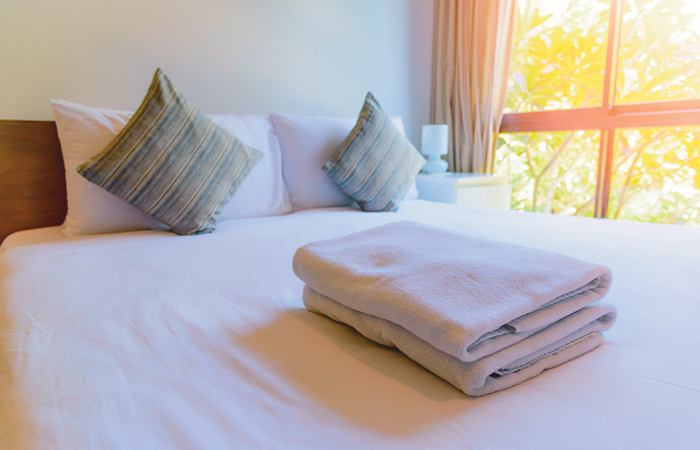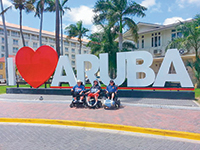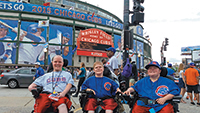
Where to Stay When Away

Tracking down accessible accommodations doesn’t have to be complicated — if you know where to look and how to book
The Horans have 14 cousins. Every year, they make the trek from Denver to Chicago to attend a high school graduation or other special occasion with their relatives. Finding accessible accommodations can be a challenge for this family of five and their bulky medical equipment. The Horans’ three adult sons have Duchenne muscular dystrophy (DMD), and each uses a power wheelchair.


In their years of travel, the Horans have learned a thing or two about booking hotels. First, they look for newer hotels. “Accessibility in older properties means it has grab bars [in the bathroom],” says Brian Horan. The family has booked what they thought would be accessible lodging only to discover that their room was on the second floor and there was no elevator. “Never make assumptions,” says Horan. He books using a hotel’s toll-free reservation line, and then follows up with a phone call to the property a week later to reiterate his requests.
Hotel booking tips
Great rates abound online, but discount hotel search engines typically do not address accessibility. Even when these sites list accessible features, the information may be inaccurate or incomplete. For example, a quick review of Dallas hotels on Room77.com returned only two “ADA Accessible” options from a list of 500 rooms. If you find a room you like through a third-party website, contact the hotel directly to confirm you’ll get exactly what you need.
WheelchairTravel.org is an informative website describing the accessibility of destinations around the world. The founder is John Morris, a triple amputee and power wheelchair user, who often has arrived at his hotel only to be told the accessible room he reserved was given away or does not exist. On a trip to Beijing, China, he was assured his room would have a roll-in shower, yet the entire property had none. This scenario left him with two options: change hotels, which almost always costs more, or find a way to adapt the room. His Beijing bathroom had a drain in the middle of the floor. The hotel secured a manual wheelchair for Morris, who showered using the long retractable showerhead installed in the bathtub.
When traveling abroad, the standards regarding access vary from one country to another, which is why Morris prefers U.S.-based hotel chains. He recommends travelers book a minimum of a month prior to their travel dates and choose refundable rates.
Hotel alternatives
Not all accessible accommodations are in a hotel. More unique lodging is available, but finding a cozy cabin in the mountains with no stairs or a Paris apartment with a roll-in shower will take some research.
House sharing
This London-based startup compares itself to Airbnb, the most popular accommodation-sharing website in the world — except Accomable focuses on accessible accommodations. Company CEO Srin Madipalli, who has spinal muscular atrophy (SMA) and uses a power wheelchair, anticipates the website will have several thousand accessible properties around the world listed by the end of this year and hopes to add equipment and adaptive vehicle rental.
Matching Houses is an international house swapping service created by people with disabilities for people with disabilities. Membership is free after completing a detailed survey regarding your home’s accessibility. Some homeowners even allow guests to use their personal vehicle or ask you to care for their pets.
Inns and B&Bs
If you are looking for an intimate getaway, consider an inn or B&B. Accessible travel expert Candy Harrington has covered the topic for 20 years. Her book, There Is Room at the Inn: Inns and B&Bs for Wheelers and Slow Walkers, includes 117 properties in 40 states. Each year, Harrington travels thousands of miles as the editor of Emerging Horizons, an online accessible travel publication, which features accommodations.
Vacation homes
HomeAway has more than 1 million vacation home rentals in 190 countries. If a property has wide hallways and doors, ramps (if needed), zero-step entry and a large main floor bathroom, it is listed as “wheelchair accessible.” (Owners self-report this information.) Renters looking for additional accessible features, such as a roll-in shower, will need to peruse the listings and speak with the owners.
Have your say
Wherever you decide to rest while traveling, let the company or owner know you appreciate their accessible accommodations by writing favorable reviews, joining loyalty programs or simply dropping them a note. Travelers with disabilities represent a growing segment of the market, and the travel industry needs to know accessible accommodations are needed and generate income.
Barbara Twardowski has Charcot-Marie-Tooth (CMT) disease and uses a power wheelchair. Jim, her husband, is a registered nurse. Both have degrees in journalism. They live in Louisiana and write about accessible travel, health and lifestyle, and related issues.
Insider Tips for Hotel Stays
The nonprofit Open Door Organization’s mission is teaching businesses how to succeed in the disability market. Their 2015 study of travelers with disabilities found nearly half of those surveyed encounter obstacles at hotels. The most common areas of dissatisfaction are inconvenient rooms, difficulty opening doors and lack of proper shower facilities.
Here are some tips for overcoming these and other challenges at a hotel:
Speak up. When booking a hotel room, be specific about what you need. If you can’t walk long distances, ask to be close to the elevators. Want to spend time in the swimming pool or spa? Confirm the hotel has a lift. Be patient when speaking to hotel staff. They may not be familiar with accessible terminology. Always ask for the name of the person with whom you speak in case there is a problem.
Shower comfortably. Many hotels with roll-in showers lack a built-in shower bench. Ask the front desk or housekeeping department if the hotel can supply a portable bench. Consider traveling with your own portable bath seat. Roll-in showers are messy; always ask for extra towels.
Rest easy. The height of hotel beds varies and can be several inches higher or lower than a wheelchair. Pack a transfer board to avoid struggling in and out of bed.
Count the beds. Accessible hotel rooms, especially those with roll-in showers, routinely have one king size bed. If you are traveling with a companion and need two beds, ask if a roll-away bed or sofa sleeper is available. Another option is to choose an all-suite or extended stay hotel.
The World at Your Wheels
Accommodations are just the tip of the iceberg when it comes to accessible travel topics. Check out curbfreewithcorylee.com, a blog about destinations, air travel advice and more by Cory Lee, a travel enthusiast who has spinal muscular atrophy (SMA). Be sure to read about how Lee finds a place to stay when he travels in a web-exclusive article titled Four Steps to Booking a Hotel Room for Wheelchair Users.
Fly Without Limits
Access to air travel is an important element of living life without limits. To learn how MDA works to improve the experience for air travelers with disabilities and how you can be a part of it, read Access MDA's Taking Action on Airplane Accessibility. You can also learn about these efforts by reading Accessible Air Travel: An Important Element of Living Life Without Limits.
MDA Resource Center: We’re Here For You
Our trained specialists are here to provide one-on-one support for every part of your journey. Send a message below or call us at 1-833-ASK-MDA1 (1-833-275-6321). If you live outside the U.S., we may be able to connect you to muscular dystrophy groups in your area, but MDA programs are only available in the U.S.
Request Information